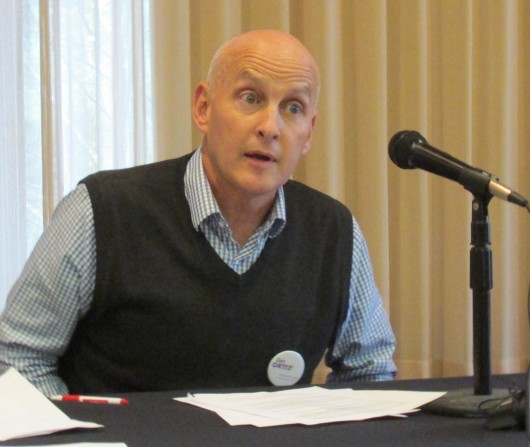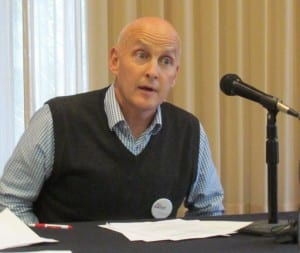The Alaska Legislature is about two weeks into the current session. KRBD’s Leila Kheiry talked with House District 36 Rep. Dan Ortiz to get a sense of how the session is going, so far.
Rep. Ortiz says the atmosphere in Juneau is pretty positive, with most lawmakers focused on resolving the state’s $3.5 billion deficit rather than delaying action.
Ortiz says the House is pushing to get its budget plan complete and to the Senate for consideration sooner than usual.
“So that we can get into the process of budget talks across both parties and across aisles, etc.,” he said.
Ortiz is on the House Transportation Committee, where there has been discussion about Gov. Bill Walker’s call for an increased fuel tax.
Ortiz says lawmakers from Western and Southcentral Alaska were worried about how such a tax increase would affect their constituents. But, Ortiz says, the rural areas likely will be the ones that will feel state service cuts the most if enough new revenue sources aren’t implemented.
“It’s a good example of how there’s no easy answers to this fiscal situation that we’re in,” he said. “Hopefully the dialogue will continue and we’ll be able to give good, due process to all these initiatives and argue the pros and cons, and see where it all comes out.”
In addition to the fuel tax, options to add revenue include an income tax, a state sales tax and using a portion of the Permanent Fund earnings. Ortiz says none of the options are popular, but something has to be done.
“I don’t want to touch the Permanent Fund or the way that we hand out the Permanent Fund Dividend checks. I don’t want to start paying an income tax, but the reality is, we have to look at some of those things and we do have to solve this fiscal situation,” he said. “It’s in the best interest of everybody in the state that we do that.”
Ortiz surveyed constituents in House District 36 before the session to see what residents think about various options to solve the state’s deficit. He says the results were mixed, although there was general agreement that the Legislature should cut more from the budget.
”But then, at the same time, they often in their survey will say, ‘But don’t cut the ferries.’ Or, ‘Don’t cut senior services anymore.’ And of course, therein lies the problem,” he said. “Everybody in a general sense likes the idea of cutting the budget, but then when you talk about the specific things, there’s strong constituencies for pretty much every government program that’s out there.”
Ortiz says his office does plan to conduct another survey now that more details of revenue options are available.
Ortiz has co-sponsored a couple of bills. One calls for a Constitutional amendment that would solidify a previous advisory vote by the public establishing a 90-day session.
He also has co-sponsored a bill that would change the per-diem compensation for lawmakers. The bill would prohibit lawmakers from collecting a per-diem if a special session takes place in that lawmaker’s home town, and would limit hotel cost compensation to lawmakers traveling on state business to $150 per day. It also reduces reimbursement for meals.
Ortiz says those changes may not make a big difference to the budget, but.
“It just makes good sense to me that, if we’re calling on others to deal with cutbacks, and to deal with new revenue increases at the same time as cutbacks, we better be doing what we can to help make ends meet at well,” he said.
Ortiz says cuts to education and the Alaska Marine Highway System probably are unavoidable, but he will push for cuts that make sense. For example, he says, suggested cuts to preschool funding might not be the best choice.
“I think the evidence shows that investments in preschool programs show that they actually save money in the long run down the road in added education costs for students that don’t receive that kind of support in their younger days,” he said.
He says some lawmakers have said they want to reduce the base-student allocation to schools, as well. Ortiz, a former public school teacher, says he will continue to advocate for students, the Alaska Marine Highway System and senior services, especially.
Ortiz encourages constituents to contact him with their concerns and ideas. He can be reached locally at 907-247-4672. His Juneau office number is 907-465-3824.
Ortiz also can be reached by email at rep.dan.ortiz@akleg.gov.







